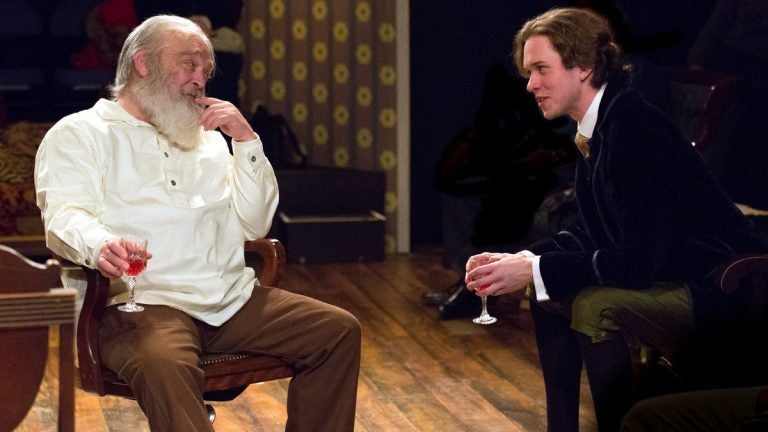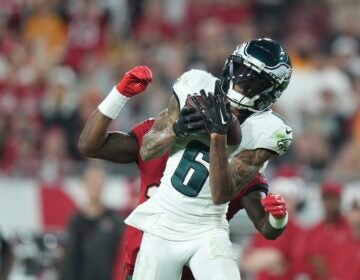Review: ‘Mickle Street,’ or wherever

Buck Schirner (left) as Walt Whitman and Daniel Fredrick as Oscar Wilde in Walnut Street Theatre's production of 'Mickle Street.'
Playwrights fool with history all the time. — Shakespeare made a career of it. Normally, they get the basics — the foundations they use as a springboard for dramatic license — right.
That’s why Walnut Street Theatre’s world premiere “Mickle Street,” which it commissioned from local playwright Michael Whistler, is a disappointment from the start. Whistler imagines the first of two conversations that actually took place between Oscar Wilde and Walt Whitman in the Camden home where Whitman was living. Wilde, famous as a British dandy but not yet as a playwright, was here from London on a busy North American lecture tour about home decoration and the meaning of beauty.
Whitman’s poetry had greatly influenced Wilde, who would be in Philadelphia to give a lecture. On Jan., 18, 1882, Wilde crossed the Delaware River to visit the poet he so admired. In Whistler’s “Mickle Street,” the dandified Wilde and the avuncular Whitman visit at Whitman’s place – and Wilde says in many ways that he’ll never forget his day on Mickle Street.
For the record, it’s unlikely that Wilde ever set foot on Mickle Street, where two years later Whitman bought the only home he ever owned – a place that serves as a Whitman museum on the street that’s now called Martin Luther King Jr. Boulevard. Wilde visited Whitman at the Camden home where he lived on Stevens Street, a place owned by his brother and sister-in-law. Even the Walnut’s promotional material tells us, quoting the play’s title, that “audiences will travel to “Mickle Street” and spend an afternoon with two great writers.” If so, I’m not sure who they might be.
I cite the misnamed play not to belabor a point, but to question whether playwrights or screenwriters have any responsibility to honor basic facts while creating a myth around them. People may choose to see “Mickle Street” for many reasons, and one of them is that the play has its roots in truth. Shouldn’t the facts of the matter be accurate?
We may be able to forgive this, if not overlook it, were the play itself revealing, moving or satisfying. But “Mickle Street” is an awkward piece, loaded with possibility at the beginning before Wilde arrives, then tedious in the middle when the two men converse and argue, then strong at the end when Whitman comes forth with some professional advice for the young Wilde. At the very end, it’s cheap when the poet uses the idea of nobility as a cover for sexual desire. Everything, of course, comes down to sex – it just takes a plodding time to get there. Whitman has a predilection for men. And Wilde? As yet, he’s too frightened of that concept to be honest with himself. If Whistler wanted to give the play an accurate title, it could be “Two Repressed Worlds, Old and New.”
Meanwhile, we get a heated discussion about the purpose of art (“to see what’s there and love it,” Whitman says as if this is an epiphany) in the modern world. (“Life without industry is barren and industry without art is barbaric,” lectures Wilde.) There’s a straw man in all this – in this corner, science, in that corner, beauty. And given that the discussion is built on the merits of the aesthetic movement of the time – an idea now lost to historical footnotes – we listen in, feeling like outsiders in a conversation.
The play’s three solid performers give us nicely built characters who clearly fit the sensibilities of the day, which Whistler excels at conjuring in his script. Wilde, dressed in a blue velvet jacket with green satin pantaloons (Amanda Wolff’s costume design), greets Whitman with “Mr. Whitman, how too too utterly utter” and it sounds right. Whitman gets right down to business: “How much is this devil paying you?” he asks about Richard D’Oyly Carte, the Gilbert & Sullivan impresario who’s arranged Wilde’s tour. It’s the small talk, right down to admonitions to Whitman to wash up after using the loo, that feels real in “Mickle Street.”
Veteran actor Greg Wood directs “Mickle Street” on Andrew Thompson’s set of mismatched furniture and clutter. (Wilde himself reported that the discussion took place in a bare and white-washed room.) Wood gets fine interpretations from his cast: Buck Schirner offering a personable Whitman, Daniel Fredrick as a Wilde clearly in charge of his own airs, and Sabrina Profitt as Whitman’s friend and helper – and in this play, the truth-teller.
What brings you here?, Whitman asks Wilde in several different ways throughout. Wilde is unmovably evasive – perhaps we’re to think, at the end, that he visited for a necessarily veiled discussion of homosexuality. Unlikely, though, given that on arrival Wilde had no details of Whitman’s private life. Was it sheer literary admiration that brought Wilde to Camden? More likely, but not terribly theatrical. In the end, we can’t answer Whitman’s question, in the context of “Mickle Street,” any better than Wilde.
“Mickle Street” runs through March 8 on the third-floor stage of Walnut Street Theatre, on Walnut Street between Eighth and Ninth Streets. 215-574-3550 or www.walnutstreettheatre.org.
WHYY is your source for fact-based, in-depth journalism and information. As a nonprofit organization, we rely on financial support from readers like you. Please give today.




